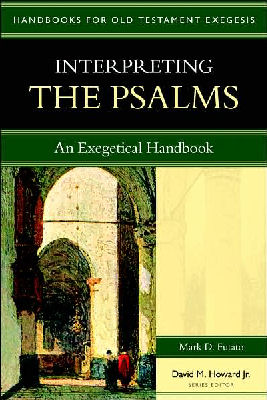
|
Posted February 6, 2008
Book: Interpreting the Psalms: An Exegetical Handbook Author: Mark D. Futato Kregel Publications. Grand Rapid, MI. 2007. Pp. 234 An Excerpt from the Preface:
Upon successful study of this volume, you will be able to 1. Understand the nature of Hebrew poetry and use this understanding as a key tool for interpreting the psalms. 2. Understand the purpose and message of the Psalms as a literary whole, so that you can interpret specific psalms in their proper literary context. 3. Understand the primary categories of psalms so that you can interpret specific psalms in their proper generic context. And 4. Understand how to shape your interpretation of the psalms, so that you can present your understanding with clarity and conviction. An Excerpt from the Book: Instruction for Holiness The book of Psalms holds out the prospect of attaining that which the human heart longs for, true happiness. Having seen that Psalms is an instruction manual for guiding readers to a truly happy life, we now ask the question, “How is this happiness attained?” The answer is, in a word, “holiness.” A holy life, according to the book of Psalms, results in a happy life. A holy life, as I am using the term, is simply a life lived in keeping with God’s instruction. Psalm 1:1-2 says, for instance, that happiness results from delighting in and meditating on God’s instruction. This same connection between happiness and God’s instruction is made elsewhere in the book of Psalms. “Happy are those whom you discipline, O Lord, and whom you teach out of your law.” “Happy are those whose way is blameless, who walk in the law of the Lord. Table of Contents: 1. Appreciating the poetry 2. Viewing the whole 3. Preparing for interpretation 4. Interpreting the categories 5. Proclaiming the psalms 6. Practicing the principles |
|
